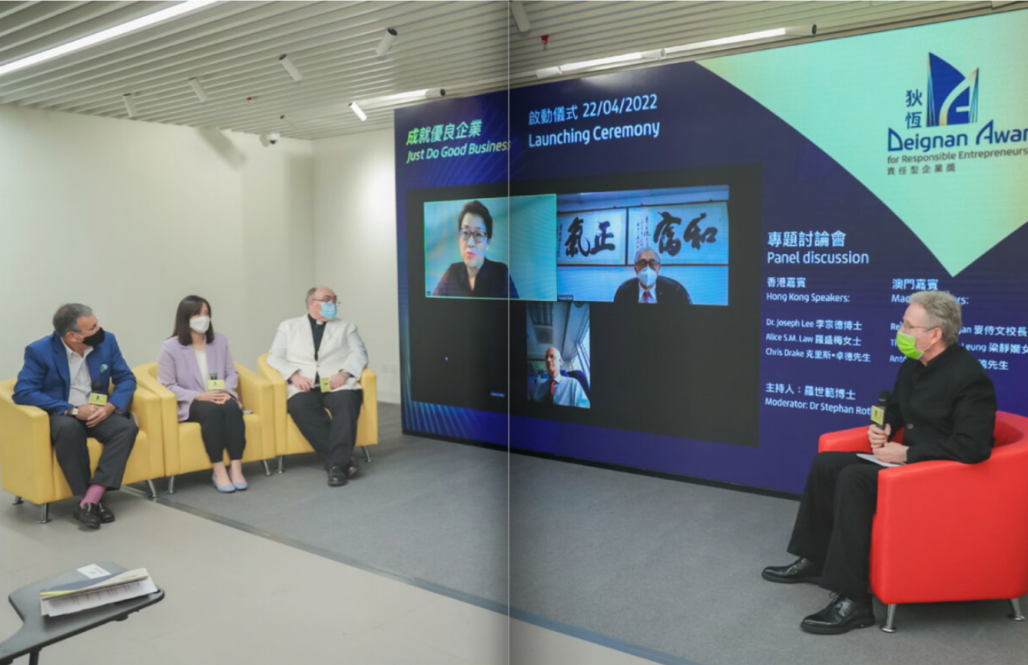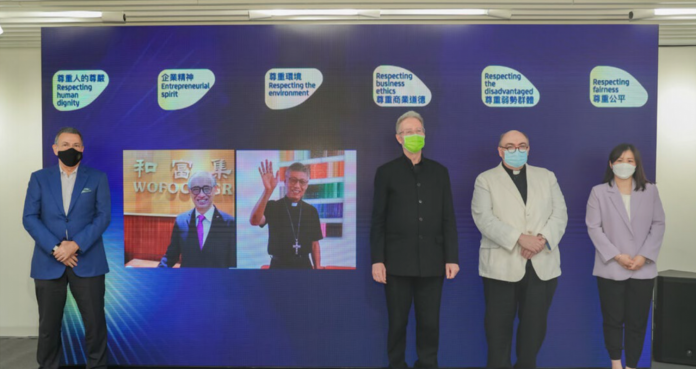DEIGNAN AWARD FOR RESPONSIBLE ENTREPRENEURSHIP

Fr. Stephan Rothlin SJ
Director of the Macau Ricci Institute at the University of St. Joseph,
Researcher at the Faculty of Business and Law
of the Faculty of Business and Law of USJ,
CEO of Rothlin International Management Limited, Hong Kong & Beijing
The launching of the “Deignan Award for Responsible Entrepreneurship” marks a milestone in the development of the ESG (Environmental, Social and Governance) agenda in Macau and in Hong Kong. When I started doing business ethics consulting and research in China, Hong Kong and Macau more than twenty years ago the promotion of the so-called “good practices” seemed to be an entirely hopeless endeavour in a culture suffering from rampant corruption, widespread labour abuse and a host of unfair trade practices. The awareness of the need to implement “Corporate Social Responsibility”—or the new catchword ESG—has undeniably risen over the past few years. In fact, facing the renewal of their licenses, corporations are now challenged to demonstrate in a tangible way that their wellbeing and profits benefit the larger society.
There are still lingering doubts about the timing of such an award precisely when so many people simply struggle to survive, and during a period where a growing number of people feeling frustrated about the way the pandemic is handled are considering leaving Macau or Hong Kong.
These doubts need to be taken seriously because the point of such an award would certainly not be to create a mere dreamworld but to initiate a competition which inspires innovation and entrepreneurship, reflecting a sense of fairness and integrity. The ongoing crises, now made more urgent with the prospect of an escalatory trajectory of the war in Ukraine, may offer Macau a healthy wake-up call to break away from its overreliance on monopolies and focus instead on the need of many young people hoping to make their own start in business.
I always felt that the strongest inspiration for ethical behaviour comes when leaders walk the talk and stick to their values. As I had the chance to work over many years with Fr. Alfred Deignan SJ (1927-1918) on different business ethics projects, I felt that the example of this widely esteemed educator with a passion of sharing the values of integrity, compassion and honesty left a decisive mark in various circles of society in Hong Kong and beyond. I felt therefore that in these times of crisis the Deignan Award could be a very inspiring way to demonstrate the positive impact of sound values that are making a difference in our very demanding and competitive marketplaces.

Alfred Deignan who served also as a founding member of the Macau Ricci Institute shared with me his disappointment that often enterprises pay mere lip service to compliance, business ethics, ESG and Corporate Social Responsibility. This frustration over what he sensed was wide ranging hypocrisy as well as some research on the impact of awards by my colleagues inspired me to create an award linked with the memory of this passionate educator. The Deignan Award is meant to remind businesspeople in Hong Kong and Macau that a new paradigm of economics oriented to the benefit of the larger society in contrast to a narrow focus on profit maximization is not only urgently needed but also may be a key to sustainable success in business. I would therefore expect that over time the Deignan Award could mark a combined effort from different players in society seeking to combine entrepreneurship with sound ethical business practices. There is plenty of empirical evidence that a firm commitment to due diligence and good business practices will more and more become a critical factor for success and would for sure minimize a host of risks linked to traditional practices of corruption.
The award obviously presupposes that the candidates are diligent in their compliance with the rule of law and ethical norms. However, a key success factor is to demonstrate that a SME has made some significant progress in a certain area of Responsible Entrepreneurship. This need not require excellence in all the areas of Corporate Social Responsibility. However, a key point is to demonstrate that ethics and law are enhanced as key factors for business success and implemented at all levels in an enterprise.
A unique feature of the Deignan Award is the strong link between entrepreneurship and ethics. There is often a misunderstanding that CSR stands in the way of business success as a kind of roadblock. This is demonstrably false and counterproductive. The Deignan Award will collect empirical evidence showing how much social innovation and entrepreneurship can be enhanced through sound business practices. Another major feature is that we have a sound academic groundwork for the award. Instead of falling into the trap of superficial glamour surrounding all-too-many awards, my colleagues from various sectors of academia in Hong Kong and Macau have been working very diligently to define appropriate criteria for the award. There will be a continuous process of evaluation of ways to define and to improve the award. I am also glad that we have produced a solid body of bilingual materials in English and in Chinese about what Responsible Entrepreneurship and CSR are all about and how they can shape a new business culture.
It is already a positive sign that our teams involve so many different key business players in Macau and in Hong Kong. However, we must work very hard to bring the networks together to debate various aspects of key issues and make sure that the key values of the award which are not financial get the recognition they deserve. We must recognize that there is still a long way to go in bringing about a new economic paradigm.
The usual dynamic is to aim to lay a firm ground in the first and second award cycle with a clear communication strategy about the award’s aim and methods. This will be the basis to extend and develop the award so that it will gain prominence beyond Hong Kong and Macau in the Greater Bay Area. With our colleagues we have concluded that it may be prudent to start first in Macau and in Hong Kong and make all the possible efforts to communicate the award’s values here. However, from the very beginning we have in mind that SMEs from Mainland China will be able to participate at a later stage.
The slogan and encouraging message of the Deignan Award is: “Just do good business.”
I think that it is quite tough these days, given several obstacles and restrictions, to be financially successful while still paying full attention to ethics and law. I therefore hope that the Deignan Award will be a modest but significant element in creating like-minded networks of SMEs in Hong Kong and Macau. No matter at which stage of an SME’s development, entrepreneurs need the constant support and inspiration especially from people who have proven that it is worth going the extra mile: that SMEs doing good business are the engine of sustainable economic development. Moreover, I have published a set of 46 cases of Business Ethics under the title “Doing Good Business in Chinese” (World Scientific Press, 2021) which argues on an empirical basis that sound ethical business truly “counts” and is rewarded with success in business.
The Deignan Award will hopefully reveal one of Macau’s comparative advantages, which is sadly too often overlooked or just simply ignored: Despite or in midst of simplistic misconceptions of Macau as a gambling hub, the Deignan Award could open a host of new perspectives on Macau as a unique platform of intercultural exchange and mutual tolerance, that have been cultivated over centuries and have never been affected by any major violent clashes. In the midst of preconceived and misinformed ideas contrasting what the “West” and what “China” may be about, the achievements of award winners will certainly demonstrate how business success actually results from mutual respect and genuine reciprocity, inspiring a constant drive to innovate and listen to each other. Despite or in midst of massive current challenges, Macau and Hong Kong can still be rediscovered as privileged places where their cultural and economic achievements would not have been possible without the mutual embrace of basic tolerance and the genuine joy that personal and business success for sure will benefit the larger society.
























